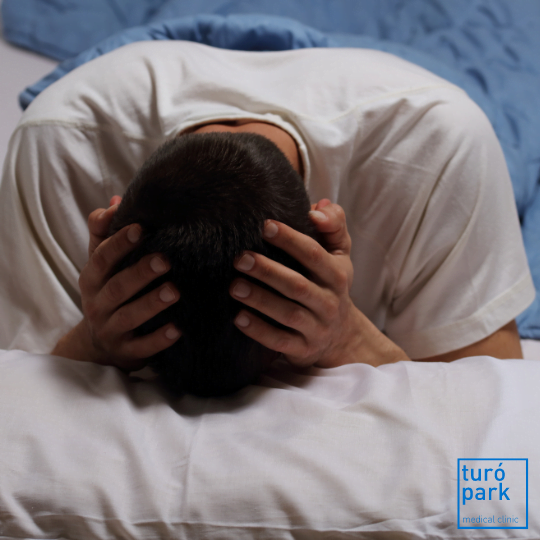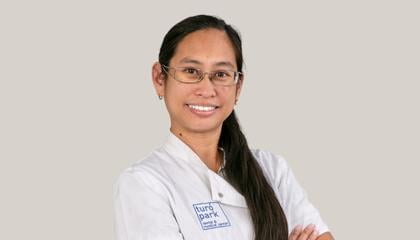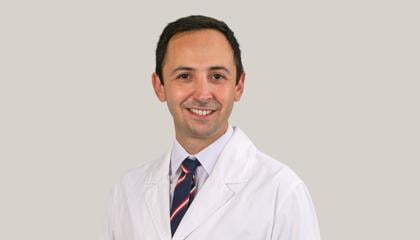Are you looking for a specialist in sleep disorders in Barcelona?
A sleep disorder can affect your overall health, safety, and quality of life. Lack of sleep can affect your ability to drive safely and increase your risk of other health problems. If you are looking for a specialist in sleep disorders in Barcelona, don't hesitate to book an appointment with our dedicated team.
Our Sleep Unit is a multidisciplinary unit that deals with sleep disorders in a coordinated way and offers a rapid response to the patients. Its objective is to offer comprehensive assistance in diagnosing sleep pathology through a sleep study or respiratory polygraphy to cover all areas: sleep pathology, hypersomnias, insomnia, parasomnias and circadian alterations, for all ages.
The unit consists of several specialists in sleep disorders: ENT, neurologist, family doctor, pneumologist and dentist. Don't hesitate to make an appointment to find the right solution for a good night's sleep.
Fast track your treatment
To book an appointment or speak with one of our friendly team, please get in touch using the options below.

What are the main sleep disorders?
Snoring is often a symptom of some type of sleep disordered breathing. The cause of snoring can be very varied, from different maxillofacial and/or mandibular anatomical alterations, as well as hypertrophy of the soft parts of the upper airway (soft palate, tonsils, tongue, uvula, etc.).
There are other factors that also favor snoring independently of our anatomy or muscular dynamics: overweight, smoking, alcoholism, etc.
To find out if it is a social problem of snoring or if it is also associated with apneas, it is necessary to perform a sleep study (polysomnography).
Sleep apnea is the interruption of breathing that occurs moments after falling asleep and is preceded by loud snoring for at least 10 seconds.
Sleep apnea can be caused by a person's physical structure or medical conditions. These include obesity, large tonsils, endocrine disorders, neuromuscular disorders, heart or kidney failure, certain genetic syndromes, and premature birth.
Early detection of the pathology is important. Therefore, a sleep study is required to establish a treatment.
Insomnia is the difficulty in falling asleep or staying asleep during the night. It is a very common problem among the population, being more frequent in women, the elderly and people with psychological problems such as anxiety and depression.
Insomnia can be acute (short-term) or chronic (long-term).
To diagnose insomnia, your health care provider will consider:
- Your medical history
- Your sleep history. Your provider will ask for details about your sleeping habits
- A physical exam to rule out other medical problems that may cause insomnia
- He or she may recommend a sleep study. It measures how well you sleep and how your body responds to sleep problems
Restless legs syndrome is a neurological disorder characterized by the appearance of an uncomfortable, non-painful sensation in the legs that makes it necessary to move them. It is a common and chronic disorder.
The etiology of this disorder is unknown, although cerebral iron deficiency and alterations in dopamine neurotransmission are suggested as possible causes.
Restless legs syndrome can sometimes be diagnosed in the doctor's office by taking the patient's medical history. Some tests can also be very useful for its diagnosis, such as polysomnography to determine if there are periodic leg movements and to evaluate the quality of sleep of patients.
Narcolepsy is a sleep disorder that produces extreme daytime sleepiness. Other associated symptoms include sleep paralysis (feeling unable to move or speak without loss of consciousness), hypnagogic hallucinations (“lived” dreams, with experiences difficult to distinguish from reality) or fragmented nighttime sleep.
Narcolepsy is a chronic disorder that cannot be cured. However, symptoms can be controlled with medication and lifestyle changes.
Idiopathic hypersomnia (IH) is a sleep disorder in which the person is excessively sleepy (hypersomnia) during the day and has great difficulty waking from sleep.
Excessive sleepiness can be caused by multiple systemic diseases, neurological diseases or diseases of the sleep-wake rhythm control itself.
The cause must be determined in order to establish the most appropriate treatment.
What are the causes of sleep disorders?
There are different causes of sleep disorders, including:
- Stress
- Mental illness, including depression and anxiety
- Poor sleep habits
- Caffeine and alcohol consumption
- Aging
- Medication intake
- Other conditions (chronic pain, cancer, diabetes, heart disease, asthma, gastroesophageal reflux, hyperthyroidism, Parkinson's disease and Alzheimer's disease...).
Sometimes, the cause is unknown.
How are sleep problems diagnosed?
First of all, you can fill in this health questionnaire, which will support the diagnosis provided to our patients by our specialists.
The study of patients with possible sleep disorders includes a medical history with a complete general physical examination, the administration of questionnaires and sleep diaries and the performance of a sleep study (respiratory polygraphy).
At Turó Park Clinics we offer a circuit of diagnosis and treatment of sleep disorders through the study 24h with a portable monitor (ambulatory respiratory polygraphy). This is a test that is performed during the night at the patient's home, with a device that records nasal flow, snoring, thoracic-abdominal movements and blood oxygen concentration.
For whom is a sleep study indicated?
Ambulatory polysomnography is indicated in people who present:
- Insufficient or poor restorative sleep
- Persistent snoring and breathing pauses during sleep.
- Tiredness or daytime sleepiness
- Feeling of discomfort in the legs that is relieved by moving the legs
- Restless sleep with excessive movements
- Strange behaviors while asleep (talking, screaming, pacing)
Your health is our priority!
Our neurology department welcomes you for the diagnosis and treatment of all your neurological problems.

Our multilingual specialists



